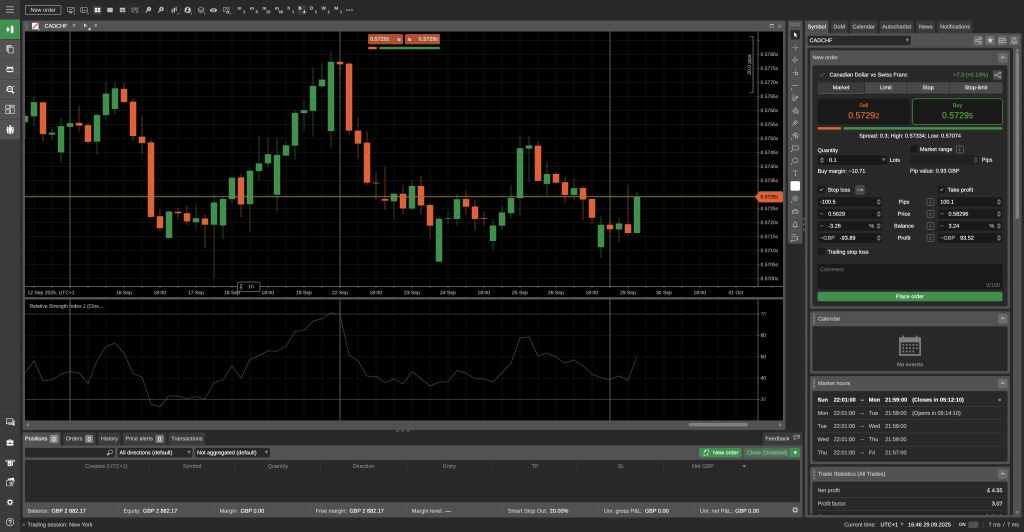Swing trading sits between day trading and long-term investing. You’re not jumping in and out every minute, but you’re not holding for years either.
Trades can last anywhere from a few days to a few weeks. That means your broker matters a lot. The right setup can make your trades smoother and cheaper. The wrong one can eat into your gains.
We’ve researched and picked out the best swing trading brokers to elevate your trading game.
What To Look For In A Swing Trading Broker
Commission & Fees
Swing traders don’t trade as often as day traders, but costs still add up. Even a small commission can eat into profits if you make dozens of trades each month.
- Zero-commission trades are now common, but be aware of potential hidden costs, such as wider spreads.
- Overnight fees don’t apply to stock purchases, but if you trade CFDs or forex, check them. Holding overnight can cost more than you expect.
- Account fees, such as inactivity charges or withdrawal costs, can be a headache.
Order Types
Swing trading often employs stop-losses and limit orders. You need tools that let you manage risk and set exits without constantly staring at the screen.
- Stop-loss orders protect you if the trade moves against you while you sleep.
- Limit orders allow you to buy or sell at a specific price, rather than the current market price.
- Good-’til-canceled (GTC) orders are valid since swing trades can last weeks. You don’t want an order to expire after just one day.
Charting & Analysis Tools
Swing traders rely heavily on charts. You’re looking for technical setups, not company fundamentals. So charting matters more than news feeds.
- Multiple time frames—4-hour, daily, and weekly charts are the backbone of swing setups.
- Indicators like moving averages, RSI, and MACD should be easy to add.
- Drawing tools for trendlines and support/resistance levels make analysis more straightforward and more effective.
If the broker’s platform makes charting clunky, you’ll waste time or end up using outside software.

cTrader provides clean charts, popular indicators, and solid drawing tools
Execution Speed
Swing trading doesn’t need millisecond execution like scalping, but you still want reliable fills. Nothing’s worse than placing an order and seeing a big gap between your intended price and the execution.
- Low slippage matters, especially in volatile markets.
- Stable platforms that don’t freeze when volume spikes give peace of mind.
Market Access
Not all brokers give access to the same markets. Swing traders often seek variety because different markets exhibit varying levels of volatility at other times.
- Stocks: The most common choice for swing traders.
- ETFs: Suitable for broader market swings.
- Forex: Popular for those who like 24-hour markets.
- Commodities & indices: Extra options when stocks are flat.
Margin & Leverage
Many swing traders use margin to control larger positions. This can boost profits, but it also carries risks. The key is knowing what the broker offers.
- Margin rates: The interest you pay when borrowing funds. Lower is better.
- Leverage limits: Some regions cap leverage (like Europe and the UK). Make sure it fits your style.
- Risk tools: Brokers that help you track margin use can prevent surprises.
Leverage can help, but it can also wipe you out. Choose a broker that clearly outlines the risks.
Platform Usability
You’ll spend hours on your broker’s platform, so it should feel natural. Clunky platforms slow you down.
- Desktop and mobile options allow you to check trades from anywhere.
- Custom watchlists help you track swing setups.
- Smooth navigation matters more than flashy design.
Risk Management Features
Swing trading means holding overnight and over weekends. That brings gaps and surprises. Brokers with practical risk management tools can mitigate the impact.
- Trailing stops adjust your stop-loss as the trade moves in your favor.
- Alerts and notifications keep you updated without requiring you to stare at charts.
- Portfolio tracking reveals exposure across multiple trades, not just a single position.
International Access
Swing traders worldwide face varying rules and limits. A broker that works well in one country may not work as well in another.
- Regulation: Always check if the broker is licensed in your jurisdiction.
- Local payment methods: Deposits and withdrawals should be simple in your country.
- Market hours: Time zones matter when trading foreign exchange.
Customer Support
You won’t need support every day, but when something goes wrong, it matters.
- A fast response can help if orders fail or the platform crashes.
- Multiple channels, like live chat and email, are helpful.
- Clear policies on how they handle disputes give extra security.
Putting It All Together
The best swing trading broker isn’t the one with the flashiest ads or the longest list of features. It’s the one that matches how you trade.
If you make a few trades a month, focus on order types, charts, and overnight costs. If you trade more often, commission and execution speed might matter more.
Swing trading sits in the middle ground. You don’t need the fastest day-trading broker. But you do need tools to hold trades safely for days or weeks.
Take the time to test the platform, read the fee details, and ensure it aligns with your region. A broker is a tool. The right one should make trading smoother, not harder.
















































































































